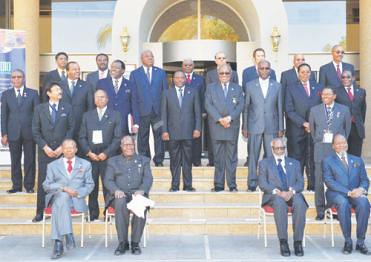
The Southern African Development Community leaders and officials gathered in Namibia to commemorate their 30th anniversary on August 16-17, 2010., a photo by Pan-African News Wire File Photos on Flickr.
Africa, BRICS co-op vital for political balance
Thursday, 09 May 2013 00:00
Dr Muguti Ngindi
Zimbabwe, Namibia and South Africa were among the last countries to attain independence and as soon as the political leadership in those countries began asserting themselves, the former colonisers worked hard to turn the population against the progressive leadership.
Zimbabwe’s case in particular is a sad story of how a former coloniser finds it hard to accept that a new black Government has a right to empower its long disenfranchised majority.
Today, there are many countries who wish to follow Zimbabwe’s illustrious empowerment and indigenisation drive, only to be deterred by the way President Mugabe’s government was pummelled, by the world’s super powers, for doing the right thing.
The emergence of the BRICS, Brazil, Russia, Iran, China and South Africa as a bloc should therefore be a welcome development given that, it give a lacking alternative to world politics and economic balance.
Since the end of the Second World War and the subsequent demise of colonialism two decades ago, Africa has increasingly become important for the development of the world, given its vast natural resources.
This is why Zimbabwe poses a real threat to the exploitation agenda of western governments.
This is precisely the reason why if Africa catches a cough the world catches a cold in terms of diamond, gold and platinum mining.
This is the reason why the US and its allies in Western European have found themselves pitted against BRICS in the ultimate war to tap the continent’s untapped natural resources. As a result, political, military and economic power of each nation, comes into play in the protracted struggle to gain access to the natural resources and with this power comes some outlandish manoeuvres such as regime change, economic sanctions on countries viewed errand and at time sponsored wars.
Nowadays many, if not all, African countries are subject to military, political and economic pressure from the US and western countries.
The end objective of Washington is to obtain leading positions on the continent and access to Africa’s natural resources.
This goes not only for Africa but also for several countries of the Middle East and Asia. The focal feature of the foreign policy of the White House is dominance of self-interest over the interests of the host country.
American efforts to destabilise the situation in some regions of Africa and Asia are aimed at creating a convincing excuse to increase US military presence those regions. But in reality, additional soldiers do not resolve the situation, which in point of fact, has actually deteriorated in countries like Iraq, Libya, Afghanistan, South Sudan, Mali and Cote d’Ivoire, where US and its allies tried to prescribe a military solution to the problem.
It should be noted that prior to the Western intervention the political situation in the above mentioned states was a balanced and stable one.
Economic and social prosperity of each country depends on the government’s ability to protect it from different threats, including foreign encroachment on the state’s sovereignty.
Gaining new political, economic and military partners can actually help African countries shake off US “tutelage”.
In this case the advance of cooperation between the African Union and Brazil, Russia, Iran, China and South Africa can present a Perspex step.
The pragmatism of such collaboration was once again demonstrated in course of the BRICS summit, which took place in the South Africa last March and was attended by a number of African leaders.
BRICS has developed from an initially consulting body with advisory functions into a factual instrument of strategic political and economical interaction.
The members of this organisation confirmed their intentions to facilitate the strengthening of international law and acknowledged the central role of the UN.
The BRICS members also demonstrated their commitment to the establishment of a multi-polar world, their “distaste” of dictatorship by the US and its allies in international affairs and BRICS understanding of the importance of a collective approach to global challenges and threats. BRICS attempts to create an alternative “force” that will be able to withstand Western predominance is very critical to the balance of political, social, political and economic power. The main slogan for March 2013 the meeting was: “BRICS and Africa: Partnership for Integration and Industrial Development”.
It was also announced that BRICS members intended to deepen the cooperation with African and Asian countries as well as with other appropriate organisations, including NEPAD.
BRICS is focused on creating a fair and just international political system and reforming of the archaic economic “architecture” of the world.
It has been decided to bring into being a new international financial institution — “Development Bank” within the framework of the BRICS.
Unlike the IMF, that basically gives money to US, Europe and Japan, it will primarily support the development of African and Asian countries.
BRICS member countries also oppose a military solution to the situation in Syria and Iran, which is exactly the opposite of what the US and its allies want. The US and its allies are already clandestinely supplying weaponry to rebels in Syria and have made it no secret, that they want regime change in Syria.
Africa is still smarting from the brutal murder of Muammar Gaddafi, the interference in Ivory Coast, Egypt, Tunisia, Democratic Republic of Congo and Mali and sees BRICS as a better and viable alternative.
Dr Muguti Ngindi writes for DayAfrica.Com
No comments:
Post a Comment